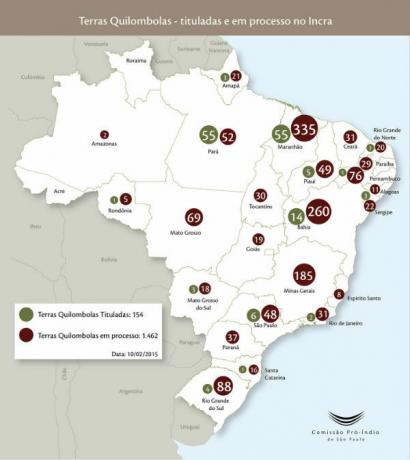Quilombos they were communities formed by slaves who escaped from the plantations.
These places became centers of resistance for black slaves who escaped forced labor in Brazil.
Origin
The word quilombo comes from the Bantu language, being a reference to "forest warrior".
The first definition of quilombo in the colonial administration took place in 1740. The Portuguese Overseas Council made it. For this institution, the quilombo was:
"all the dwellings of runaway blacks that exceed five, in part destitute, even if they do not have raised farms or find pestles in them".
What was Quilombo Life like?
The functioning of the quilombos considered the tradition of the runaway slaves who inhabited them. In these communities, various activities were carried out, such as agriculture, extractivism, animal husbandry, mining and commercial activities.
In these places, blacks tried to revive their African traditions. Best of all, they could be free again, worship their gods and practice their dances and songs.
However, they did not forget the companions who were enslaved. It was common for them to help organize escapes on the plantations or save the money they obtained from the sale of their products to buy the freedom of those slaves.
The existence of quilombos was such that a specific profession called "bush captains". They were forest-savvy men hired to recapture runaway slaves.
The resistance process was permanent. Even when destroyed, the quilombos resurfaced in other places and were another peculiarity of the Brazilian slave society.
Quilombo dos Palmares
Historians report conflicts between blacks who fled to the Palmares in the early seventeenth century. The first expedition in search of runaway slaves took place in 1612.
In 1640, there were nine villages in Palmares: Andalaquituche, Macaco, Subupira, Aquatene, Dambrbanga, Zumbi, Tabocas, Arotirene and Amaro.
The process of persecution of Quilombo dos Palmares was accentuated with the expulsion of the Dutch. In 1670, the Portuguese began to systematically attack the villages. In 1694, the quilombo was destroyed, with the death of its last king, Zumbi.
Read more at Quilombo dos Palmares.
Zumbi dos Palmares
Zumbi dos Palmares was a black leader who was born in the State of Alagoas in 1655. He is considered a symbol of resistance for having been the last king of Quilombo dos Palmares, the largest in Brazil.
Zumbi's given name was Francisco. He was born a free man and only at age 15, after being catechized in the Catholic Church, he decided to live in Quilombo dos Palmares.
He died in 1695, on the 20th of November. Today, this date is remembered as the Black Consciousness Day and is even a holiday in some Brazilian states.
Quilombos in Brazil
 Map of Brazil showing the lands of titled and titled quilombos. Year: 2015
Map of Brazil showing the lands of titled and titled quilombos. Year: 2015
Although the Quilombo de Palmares is the most famous and has entered the history of Brazil, quilombos existed in practically all Brazilian states.
Many of these places resisted endlessly and their residents are now called remnants of quilombo communities. They are the children and grandchildren of the groups that managed to survive.
Remnant Communities of Quilombos

Girls practice jongo at Quilombo do Campinho in Paraty/RJ
It is estimated that there are currently around three thousand quilombola communities in Brazil.
The inhabitants of these regions often live in a precarious situation. However, they still preserve their ancestors' traditions such as jongo, lundum, desfeiteira, handicrafts and cooking and cultivation techniques.
Likewise, they are not frozen in time and play football, dominoes and listen to current music. They interact with the non-Quilombola neighborhood and thus congregate with the community at the saints' festivities.
The claim for land ownership of the quilombolas was incorporated into the 1988 Constitution. Article 68 of the Magna Carta provides for the recognition of ownership of the lands of the remaining quilombo communities.
This process has no deadline for completion and few communities have obtained the property title.
Read more about the topic:
- slavery in Brazil
- Slavery
